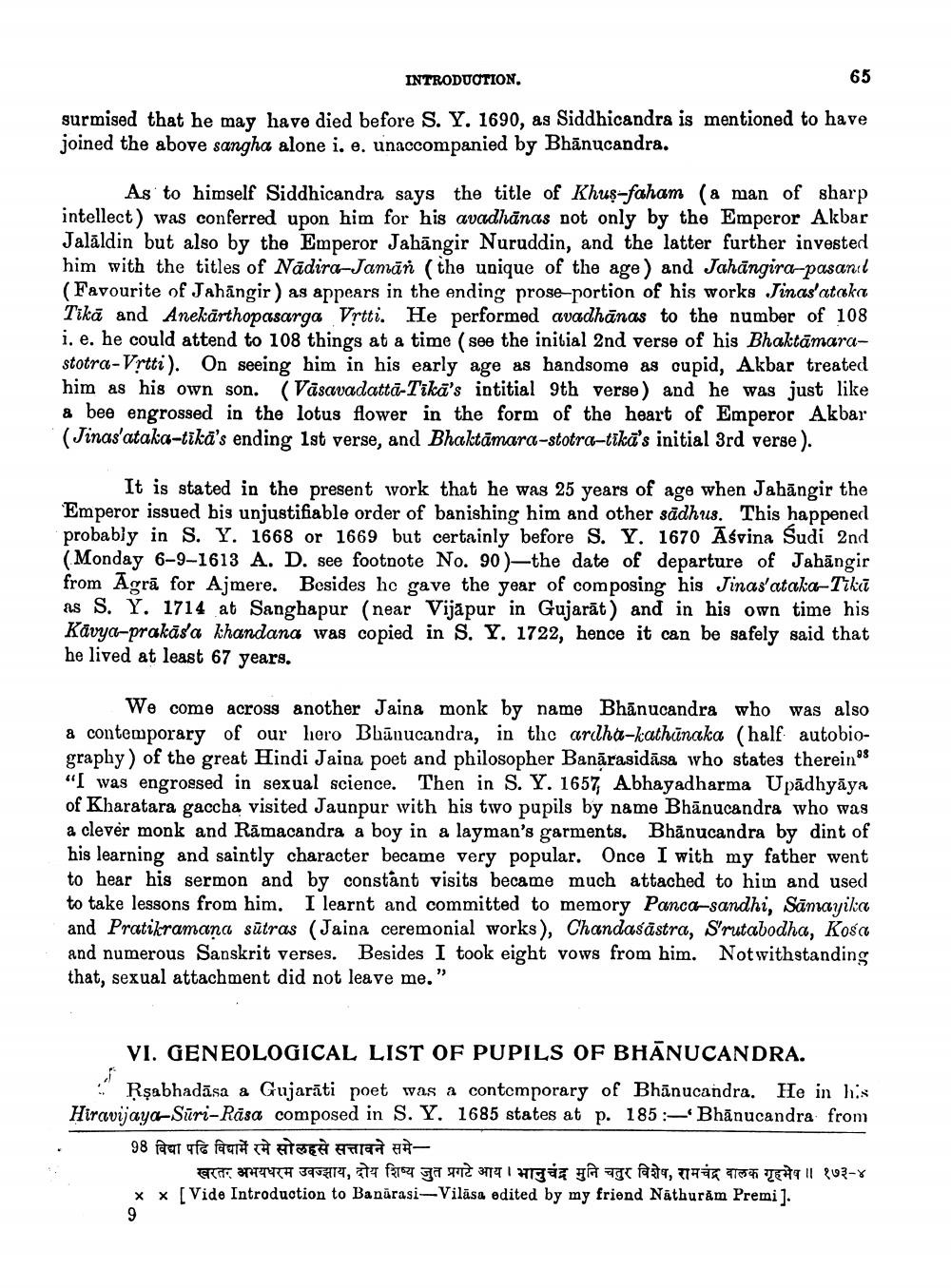________________
INTRODUCTION.
65
surmised that he may have died before S. Y. 1690, as Siddhicandra is mentioned to have joined the above sangha alone i. e. unaccompanied by Bhānucandra.
As to himself Siddhicandra says the title of Khus-faham (a man of sharp intellect) was conferred upon him for his avadhānas not only by the Emperor Akbar Jalāldin but also by the Emperor Jahāngir Nuruddin, and the latter further invested him with the titles of Nadira-Janān (the unique of the age) and Jahāngira-pasanit (Favourite of Jahāngir) as appears in the ending prose-portion of his works Jinas'ataka Tikā and Anekārthopasarga Vrtti. He performed avadhānas to the number of 108 i. e. he could attend to 108 things at a time (see the initial 2nd verse of his Bhaktāmarastotra-Vrtti). On seeing him in his early age as handsome as cupid, Akbar treated him as his own son. (Vasavadatta-Tīkā's intitial 9th verse) and he was just like & bee engrossed in the lotus flower in the form of the heart of Emperor Akbar (Jinas'ataka-tikā's ending 1st verse, and Bhaktāmara-stotra-tīka's initial 3rd verse).
It is stated in the present work that he was 25 years of age when Jahāngir the Emperor issued bis unjustifiable order of banishing him and other sādhus. This happened probably in S. Y. 1668 or 1669 but certainly before S. Y. 1670 Āśvina Sudi 2nd (Monday 6-9-1613 A. D. see footnote No. 90 )—the date of departure of Jahāngir from Agrā for Ajmere. Besides ho gave the year of composing his Jinas'ataka-Tīki as S. Y. 1714 at Sanghapur (near Vijapur in Gujarāt) and in his own time his Kavya-prakās'a khandana was copied in S. Y. 1722, hence it can be safely said that he lived at least 67 years.
We come across another Jaina monk by name Bhānucandra who was also & contemporary of our hero Bhānucandra, in the aritha-kathūnaka (half autobiography) of the great Hindi Jaina poet and philosopher Banārasidāsa who states thereinos "I was engrossed in sexual science. Then in S. Y. 1657, Abhayadharma Upādhyāya of Kharatara gaccha visited Jaunpur with his two pupils by name Bhānucandra who was a clever monk and Rāmacandra a boy in a layman's garments. Bhānucandra by dint of his learning and saintly character became very popular. Once I with my father went to hear his sermon and by constant visits became much attached to him and used to take lessons from him. I learnt and committed to memory Panca-sandhi, Sānayika and Pratikramana sūtras (Jaina ceremonial works), Chandaśāstra, Srutabodha, Kosco and numerous Sanskrit verses. Besides I took eight vows from him. Notwithstanding that, sexual attachment did not leave me."
VI. GENEOLOGICAL LIST OF PUPILS OF BHĀNUCANDRA.
Rşabhadāsa a Gujarāti poet was a contemporary of Bhānucandra. He in his Hiravijaya-Sīri-Rāsa composed in S. Y. 1685 states at p. 185:- Bhānucandra from
98 at af faart TEAM
___ खरतर अभयधरम उवज्झाय, दोय शिष्य जुत प्रगटे आय । भानुचंद्र मुनि चतुर विशेष, रामचंद्र वालक गृहभेष ।। १७३-४ xx Vide Introduction to Banārasi-Vilāsa edited by my friend Näthurăm Premi).
9




